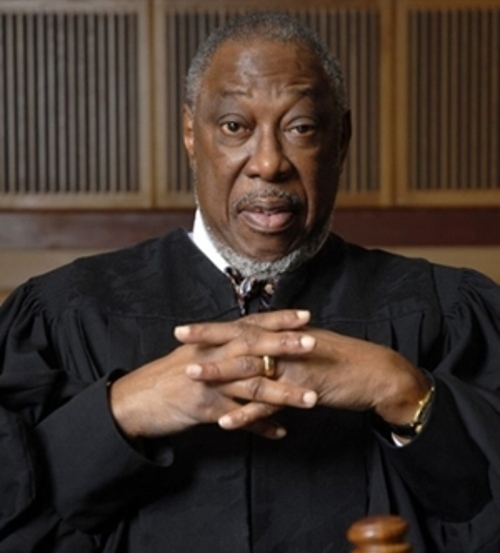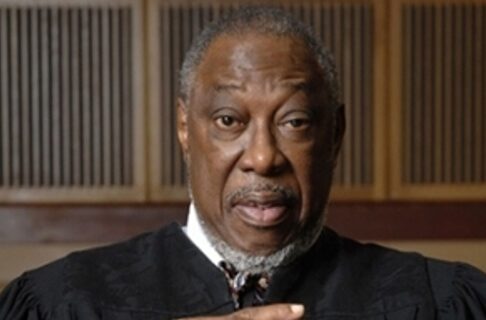The Honorable Marvin Stephens Arrington Sr. (67L), one of Emory University School of Law’s first Black graduates, died on July 5 at 82 years old. He led a storied legal and political career in Atlanta and left a lasting impact on the law school, according to Emory School of Law Dean Mary Anne Bobinski.
Marvin was born in Atlanta in 1941 and lived in the city nearly his entire life. He grew up in the Grady Homes housing project and attended E.R. Carter, English Avenue and A.F. Herndon public schools. Marvin was involved with the YMCA and played tennis and football as a kid, according to Stuart A. Rose Manuscript, Archives and Rare Book Library Director Jennifer Gunter King.
Marvin’s life is chronicled in filmmaker Adelin Gasana’s documentary “Bo Legs: Marvin Arrington, Sr., an Atlanta Story.” Although Marvin grew up in what Gasana called “the ghetto of a segregated town,” he would go on to “greatly” impact the development of modern Atlanta. The University is hosting a screening of the documentary in honor of Marvin on Oct. 18 in Harland Cinema.

Photo courtesy of Emory University
“His public service is four decades strong, and it came from humble beginnings,” Gasana said. “He wasn’t supposed to make it.”
Marvin received his bachelor’s degree in sociology in 1963 from Clark College (Ga.), now called Clark Atlanta University, the first historically Black higher education institution in the South. Marvin then attended Howard University School of Law (D.C.) for a year before transferring to Emory Law, where he earned his juris doctor in 1967.
When Marvin transferred to Emory Law in 1965, he became one of the school’s first full-time Black law students alongside Clarence Cooper (67L), who transferred from Howard to Emory alongside Marvin.
“Clarence and I pretty much stayed to ourselves and did our work,” Marvin told Emory Magazine in 1998. “We didn’t have people jumping up and down because we sat next to them.”
Marvin was also among the first Black graduates from any school within the University. Verdelle Bellamy (63N) and Allie Saxon (63N) were the first two Black students to graduate from the University, each earning a master’s degree in nursing. Charles Dudley (67C) was the first Black student admitted to Emory College of Arts and Sciences. Dudley graduated from Emory the same year as Marvin.
In law school, Marvin met and befriended J. Ben Shapiro (64C, 67L). Shapiro told Emory Magazine in 1998 that Marvin and Cooper were many students’ first Black classmates.
“They were good guys, just like anybody else,” Shapiro said. “They had the same ambitions and work ethic as everybody else.”
Additionally, one of Marvin’s classmates at the law school was the first white man to ever shake his hand, according to Gasana.
“Two decades living on this planet and a white person never came up to him and shook his hand,” Gasana said. “That’s the kind of symbolism Emory University Law School provided for him.”
Gasana added that by attending Emory’s law school, Marvin carved a path for many future students — a “hallmark” of his legal career. His son, Marvin Arrington Jr. (96L), said there were dozens of Black students in his class of a few hundred students when he began his education at Emory’s law school in 1993, which had the most Black students in the school’s history at the time.
“Others saw him and they said, ‘Oh, Marvin Arrington can be a lawyer, well, then maybe I can be a lawyer too,’” Arrington Jr. said. “Knowing that someone came there before you — and that they probably had to make even more of a sacrifice — made it a lot easier.”
Bobinski said the school is more diverse than ever, something she credits to Marvin.
“The law school today is very different than the one that he had attended, but it never would have been possible without the initial bravery and willingness of Judge Arrington and his fellow student to take that first step,” Bobinski said.
Immediately after graduating from law school, Marvin worked as a student advisor at Emory to guide Black undergraduate and law students. Then, Marvin served as a field representative in South Carolina for the Office of Economic Opportunity for former U.S. President Lyndon Johnson’s War on Poverty. He focused on establishing and improving education and health care programs.
Marvin was elected to the Atlanta Board of Alderman, now known as Atlanta City Council, in 1969. He spent more than 25 years on the Council, and he served as the Council’s president from 1980 to 1997. During this time, Arrington Jr. said that Marvin used his position to stand up for the issues he believed in, telling others that he would be using the restroom designated for white people shortly after being elected.
“He was not only the youngest serving City Council member in Atlanta’s history when he was elected, but he’s also the longest-serving City Council president,” Gasana said. “That’s where he made his biggest impact.”
Highlights of Marvin’s career include leading initiatives to bring the Olympics and MARTA to Atlanta, as well as the expansion of the Hartsfield-Jackson International Airport. He also introduced legislation establishing Rev. Dr. Martin Luther King Jr.’s birthday as a city holiday and helped initiate the Hank Aaron Rookie League program, which created athletic opportunities for youth in the inner-city.
Gasana also said that Marvin played a critical role in bringing Atlanta’s zoo back to life. According to Gasana, before Marvin stepped in Zoo Atlanta was dirty and bankrupt, and the animals were dying. Marvin established a plan to issue bonds to fund the zoo’s renovation.
“It is those kinds of leadership criteria that really just kind of show how much he’s done for this community,” Gasana said.
Gasana explained that Marvin, whose venture into city government began shortly after the civil rights movement and passing of the Voting Rights Act of 1965, saw the Council as a way he could make a bigger impact and bring his vision for Atlanta to life.
“It’s just that vision … this idea that he’s a guy in the segregated poor part of town, in a Black community, totally on the beaten path and saw where this city can go and just believing in that and rocking with the right power brokers and players who can get it done,” Gasana said. “And then 20, 30 years later, we’ve arrived at that vision.”
During his time on the Council, Marvin was a practicing attorney. He opened Arrington & Hollowell in 1989 with Donald Hollowell, a highly-regarded attorney in Georgia during the civil rights movement. Arrington & Hollowell focused on worker’s compensation, labor relations and corporate bonds. Arrington Jr. noted that his father was “very big on training the next generation of young lawyers” during his legal career.
“[Marvin] helped open doors for generations of young attorneys, which for a long time, there wasn’t that many Black attorneys in the city of Atlanta, much less the state of Georgia,” Gasana said.
Marvin received numerous accolades as a lawyer. Atlanta Magazine named him one of the 25 best lawyers in Atlanta in 1983 and Black Enterprise magazine named Arrington & Hollowell as one of the top Black law firms in the United States.
Marvin also ran for mayor of Atlanta in 1997 but lost to incumbent Bill Campbell. Following this unsuccessful bid, former Georgia Gov. Roy Barnes appointed Marvin as judge in the Fulton County Superior Court in 2002.
Bobinski noted that Marvin gave back to the community throughout his career, whether he was in private practice, public service or working as a judge.
“He was a trailblazer and someone who made a difference for everyone who followed him,” Bobinski said. “He also had the kind of life and career that are inspirational to law school students and to people everywhere.”
Marvin remained committed to Emory throughout his life and wanted his family members to experience Emory as well. He encouraged his son Arrington Jr., his niece Jill Arrington (95L) and his nephew Joe Arrignton (96L) to attend Emory Law.
Arrington Jr. noted that his father was proud that he followed in his footsteps, keeping the legal tradition alive in the Arrington family, which has seven lawyers.
“He was elated that I graduated from Emory law school and would be practicing law in the greater Atlanta area,” Arrington Jr. said.
During his political and legal career, Marvin held many responsibilities at the University, serving on the University’s Board of Trustees from 1990 to 2006. He also delivered remarks at former University President William Chace’s inauguration in 1995.
Marvin also remained committed to the law school. Bobinski recalled that Marvin spoke with her on the phone to provide insight as she began her tenure as the law school’s first female dean in 2019.
“I appreciated his willingness to give up his time and experience with Emory and help provide guidance to the new law school dean,” Bobinski said.
The law school celebrated and leaned on Marvin as an alumnus, King said, referencing his communications with past law school deans included in the Rose Library’s collection.
“He was somebody whose opinions were deeply valued by the University leadership,” King said. “He was consulted on a number of conversations throughout the course of his career and life after Emory.”
The Rose Library has a collection of Marvin’s papers from 1980 to 2004. King noted that Marvin’s papers document his pride in Emory and act as a window into Marvin’s life in Atlanta. The papers, which Marvin donated to the University’s archives in 1991, include material from his time as Atlanta City Council president, his mayoral campaign and various other speeches, writings and correspondences.
“He was a big supporter of Emory University,” King said. “It’s clear from his speeches that he was very proud of Emory’s commitment to diversifying its student body and uplifting opportunities for youth in Atlanta.”
These papers, King said, give students a chance to sit down with Marvin and hear him give a first-person account on the issues that mattered to him.
“[It’s] tremendously important to be able to hear Judge Arrington discuss his priorities in his own voice as he delivered speeches, for example, given his prominence and influential role in the development of the city of Atlanta during a period of incredible growth in the population of Atlanta, the internationalization of Atlanta,” King said.
But no matter how busy his life was with work, Marvin never failed to show up for his family, according to Arrington Jr.
“Whether it was going on vacation to Hilton Head or Hawaii, or whether it was for a soccer or football game, or piano practice or whatever, he was always involved in our lives,” Arrington Jr. said. “I’m just so grateful that we had the opportunity to have him as a father.”
Outside of work, Marvin loved to play tennis, even getting to play — and lose to — late tennis player Arthur Ashe. He enjoyed spending time reading, smoking cigars and wearing bow ties, Arrington Jr. remembered.
Marvin was an extrovert with a great sense of humor, Gasana said.
“He just that kind of character — down to earth guy, the kind of guy who can pull up at a barber shop and chop it up with the fellas and keeping it real and then gets in his car and goes to Buckhead and has a white-tie luncheon with some of the high brass of the white community,” Gasana said.
Marvin never met a stranger and always asked waiters and waitresses regarding where they went to school, where they were from and how their family was doing, according to Arrington Jr.
And when someone returned the favor and asked how he was doing, Marvin always responded that “It’s the best day of my life,” according to his son.
“He would say ‘Because God woke me up this morning,’” Arrington Jr. said. “‘I’m up and alive and it’s a great day.’”
Bobinski, who attended Marvin’s memorial service at Ebenezer Baptist Church, said she was struck by the hundreds of people who showed up — a physical representation of the “ripple effects” Marvin’s life had and continues to have on the city.
“That is all that one could ever hope for in life,” Bobinski said. “There are many, many people who are having him in their thoughts, inspired by him and impacted by his legacy.”







